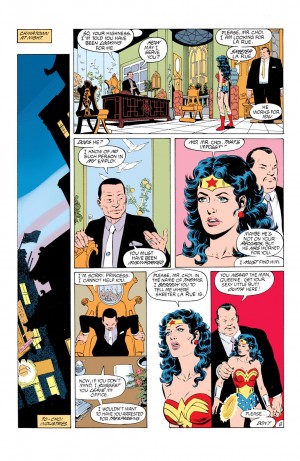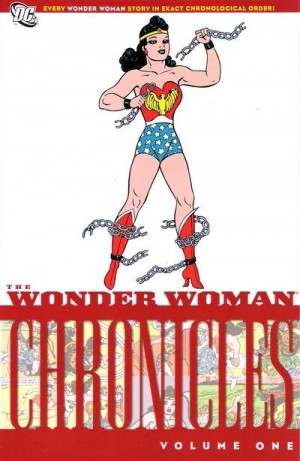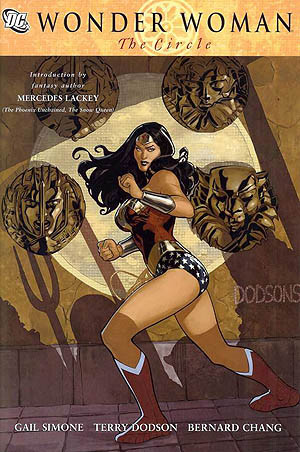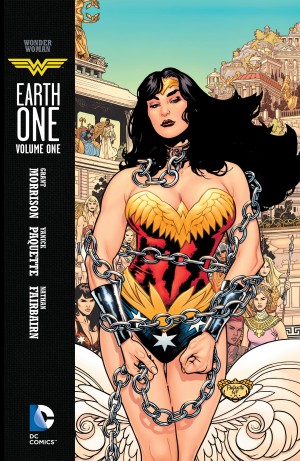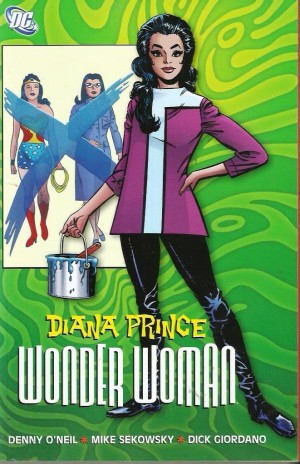Review by Frank Plowright
There’s an interesting choice made to lead off this Wonder Woman anthology, which is to run not the original origin of Wonder Woman by her creators William Moulton Martson and Harry G. Peter, but the compressed 2001 version by Paul Dini and Alex Ross, from whom the cover is also reprinted. Ross’ alluring and naturalistic Wonder Woman is based on the 1970s TV version as played by Lynda Carter, whose foreword charmingly relates how Wonder Woman changed her life.
Marston and Peter are credited with two tales, the first relating how Wonder Woman adopted the civilian identity of Diana Prince, and the second a barely believable fetishist’s delight. Although published as the work of Marston and bearing many of his trademarks, later research by Jill Lepore identifies Joye Hummel as the writer. Read in the 21st century, it’s jaw-dropping that this tale of bikini-clad women tying each other up, lovingly fitting each other with attitude-changing girdles and cross-dressing as men was considered a children’s diversion in 1948. It’s completely loopy and very entertaining as Wonder Woman’s enemies gang-up on her.
In any other company the following stories by Robert Kanigher would be the most demented by a country mile. His first is actually a clever twist on the Superman/Lois Lane conundrum with Steve Trevor attempting to trick Wonder Woman into marriage, but the other two are nuts, with aliens turning Wonder Woman bad and Prof Psycho transforming a female gorilla with a crush on Trevor into a human girl. Kanigher redeems himself in the 1980s with the touching tale of a woman who would be Wonder Woman.
Only two years separate Kangher’s gorilla story from Denny O’Neil and Mike Sekowsky filtering the psychedelic sixties, but it could be a decade, although some themes remain, and Trevor is prominent. The 1970s are represented by Eliott S! Maggin and Curt Swan in an unremarkable tale of Wonder Woman was being patronisingly shadowed by Green Lantern to assess if she met the standards for re-admittance to the Justice League.
George Pérez (sample page) re-booted Wonder Woman in the late 1980s, and his ‘Who Killed Mindi Meyer?’ is the best story in the collection, even if the impact of a supporting character’s demise is diminished by its presentation in isolation. Pérez writes much of it as hard-boiled fiction pastiche, and Wonder Woman plays very little part until the halfway point, but Pérez’s plot is clever and maintains its suspense until the end.
Phil Jimenez and Joe Kelly close the book with a day in the life story, given a neat twist by being a newspaper article by Lois Lane accompanying Wonder Woman, her commentary starting as grudging and ending in admiration. It’s predictable, hardly subtle in places and verbose, yet still pushing all the appropriate buttons. The division of writing is unclear, but the art by Jimenez inked by Andy Lanning is polished and attractive.
The title is very much a misnomer. Since the 1980s it’s been very rare that the best stories involving any character have been restricted to a single comic, yet the all-encompassing anthology demands short stories to cover all eras. Despite this and the amazing variety of mood and approach, this is a better collection than the more recent A Celebration of 75 Years. The poorer material has such an eccentric quality that it transcends prevailing standards to become something to be appreciated on a completely different level. There is filler, but its minimised, so unless you’re desperate for your Wonder Woman anthology to be as up to date as possible, this remains a decent buy.

